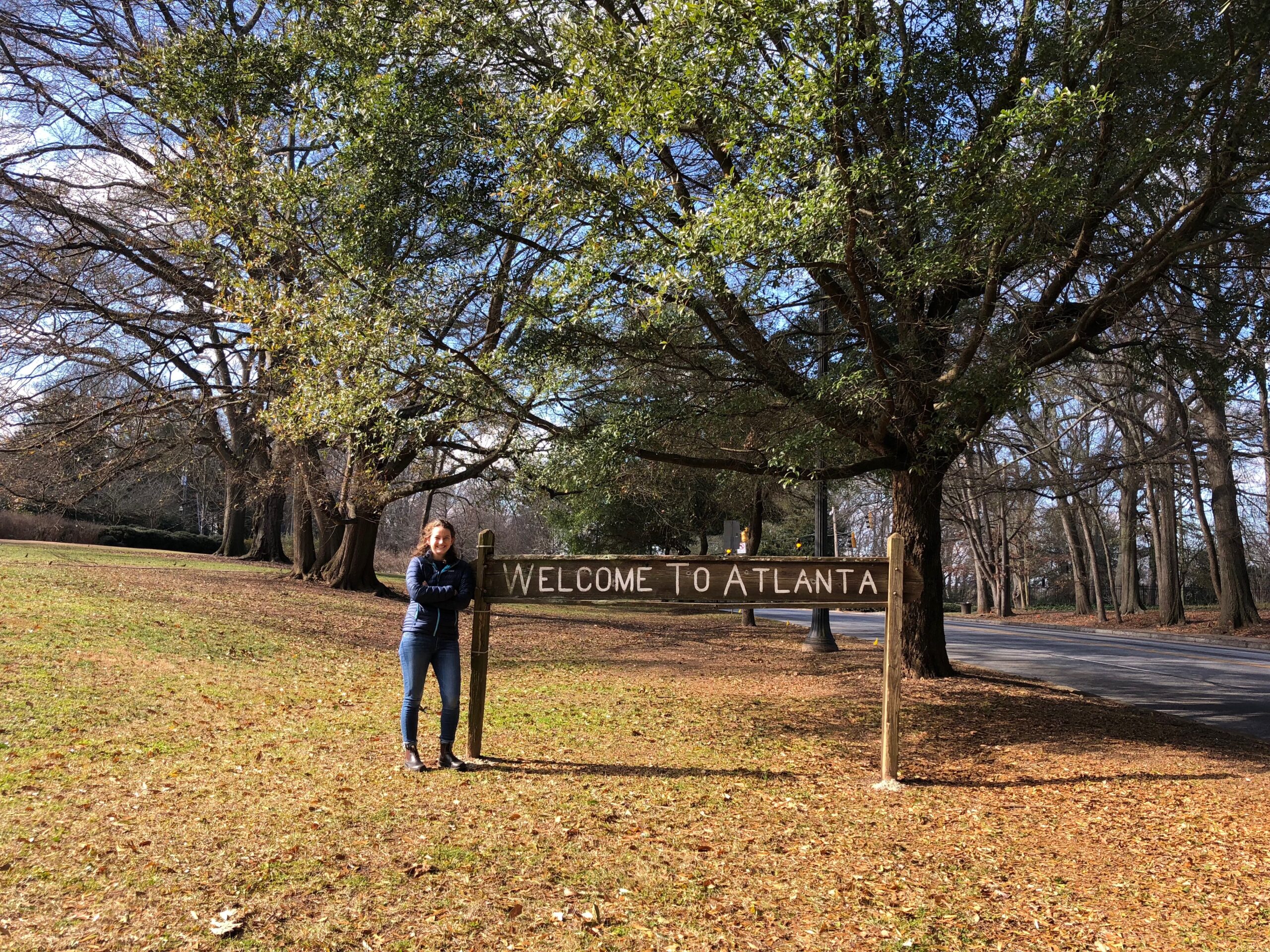Welcome to Leaving Atlanta, Georgia
March 2, 2018
 Courtesy of Carly Berlin
Courtesy of Carly BerlinAUDIO: Carly Berlin reads.
When I came to Bowdoin, everyone asked me where my accent was. Where? Nowhere. This was a matter I had never considered. I hadn’t noticed that my parents spoke with subtle twangs ’til my college friends noted this, but that would be years down the road. I’d tell the inquiring peer before me that I’m from Atlanta, with a raised brow for emphasis, and leave off the understood state at hand. Saying I hailed from Georgia felt like a foolish strategy. It also felt like a lie. I grew up in a city—a particularly progressive corner of a blue city, no less—and I could see skyscrapers from my house. And so I would evade any association with the South that my curious classmate implied. The South didn’t feel like mine.
Yet as I struggled to transition to Bowdoin—an institution not wholly different in character from the high school I’d attended—I couldn’t shake how out of place I felt here. How I’d come to New England on the odd yet earnest whim of my own New England intellectual fantasy. No one in my family had done this before; I have no close family in the Northeast. A homesickness so quick and suffocating took hold of me that I wondered whether or not I could really weather it here.
That period of doubt didn’t last long. I found friends just as invested in deciphering the strangeness of college and the shifting ideas of home we all undergo upon coming here, and in these relationships I found a new kind of belonging. But it is a time I still return to. It was when I realized how bold—how scary—my decision to move all the way up the coast was. It was a time when I began to think of myself as Southern.
•••
While I’ve had friends from home at Bowdoin with me throughout my four years, this fall a dear friend joined me here: first year Kaya Wurtzel. We were teammates in high school and shared the same favorite teacher, whose classroom walls were painted yellow and plastered with postcards of art history masterpieces. I’ve long seen parts of myself in Kaya, though I must say that I’ve watched her grow into Bowdoin with an ease and grace I’d longed for in my initial months here. Sharing this campus with her has made me feel more connected to home.
Now, I’m observing Kaya undergo the task of attempting to describe where we’re from. She likes to call this “the game of explaining the context of a place.” It’s a game I’ve played with eagerness and trepidation, in turns. At times I’ve distanced myself from any association with the stereotypical redneck rural South; at others, I’ve tried my damndest to convince folks that such a place is a fallacy, that the South is new and vibrant and cool. Sometimes I’ve relished in the oddity of coming from somewhere beyond the norm, and have made it my project to defend the South. And in many instances, I’ve asked myself what in fact I am trying to defend.
I’ve tried to withhold my tactics from Kaya. I haven’t wanted to taint her understanding of home with my own obsessive and confused reckonings.
•••
Over winter break, I asked Kaya to take me on a tour of places important to her in Atlanta. She brought me to the brewpub and billiards hall her family runs, and pointed out how she could mark periods of her life by her evolving penchant for menu items—veggie chili, and later fish tacos—and showed me the beam behind the bar where she and her cousins marked their heights as they grew. Then we drove over to Paideia, the school we shared, where Kaya nodded to the room in which she had crawled under the desks as a kid, in the high school Spanish class that her dad taught.
It struck me that Kaya took me to the very specific spaces around town for which she felt personal ownership. I’d imagined we might take a spin around the King Center, or walk the Beltline, or visit the Waffle House Museum around the corner from her house: all places that speak to an Atlantan, a Southern, identity. But I might have taken a curious friend to the places that felt explicitly mine as a first-year; the boulevard I took to school every morning comes to mind. With time and with distance from home, though, I’ve come to realize that there are many modes of ownership over place. Even as I write an honors project about my connection to home, my ideas of what is mine have only become more nebulous.
Before I dropped Kaya off at home, we walked along the park that flanks Paideia over to a simple wooden sign that reads “Welcome to Atlanta” on one side, “Leaving Atlanta” on the other. It marks the division between Atlanta proper and the next town over, somewhat arbitrarily, as the sprawling mass of the metro area includes so much more than the officially sanctioned city limits. But I’ve invested my own meaning to that flank of wood. When I pass it, I think of all the comings and goings I’ve undergone; how transitory my life has become—and Kaya’s life is becoming—in college. And I feel myself relinquishing the game.
Bowdoin Back Home
Over winter break, the Orient dispatched writers to bring stories from their homes back to Bowdoin. Though we don’t often acknowledge it, Bowdoin is shaped by our experiences in these places, just as we are. Some of these stories will contain the writer’s experiences while others will put a spotlight on their peers. All will share insight into the places and people we bring with us to Bowdoin.

Comments
Before submitting a comment, please review our comment policy. Some key points from the policy: